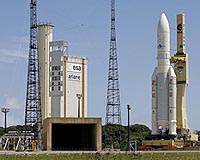 |
Paris (AFP) Aug 20, 2009 An Ariane 5 rocket is set to propel two communications satellites into space Friday, one for Japanese telecom operator SKY Perfect JSAT Corporation and second for Australian operator Optus. The dual payload is scheduled for lift off from the Arianespace launch site in Kourou, French Guiana between 22:09 and 23:09 GMT on August 21, Arianespace said in a statement. Weighing some 4,000 kilos (8,800 pounds), the JSAT satellite will provide communication services for Japan, the Asia-Pacific region, Oceania and Hawaii. It was built by US company Lockheed Martin, and is designed to last 15 years. The 2,500-kilo (5,500-pound) Optus will be the fifth satellite hoisted into orbit for the Australian operator will provide direct TV and broadcasting services for Australia and New Zealand. Made by Orbital Science Corporation in Dulles, Virginia, it too is made to function for a decade-and-a-half. Both satellites will be in geostationary orbit, meaning they will move in synch with Earth's rotation at the latitude as the equator, hovering constantly over the same spot. If successful, the launch will the 190th mission completed by Ariane rockets, and the 46th by the current generation of Ariane 5 rockets. Share This Article With Planet Earth
Related Links Launch Pad at Space-Travel.com
 Ariane To Launch JCSAT-12 And Optus D3 Friday
Ariane To Launch JCSAT-12 And Optus D3 FridayKourou, French Guiana (SPX) Aug 20, 2009 Arianespace's fourth heavy-lift flight of 2009 has been authorized for its August 21 liftoff following the launch readiness review (August 19) at the Spaceport in French Guiana. The review is performed prior to each Ariane 5 mission, ensuring that the launch vehicle and its payload are flight-ready, along with the Spaceport's infrastructure and the network of downrange tracking stations. ... read more |
|
| The content herein, unless otherwise known to be public domain, are Copyright 1995-2009 - SpaceDaily. AFP and UPI Wire Stories are copyright Agence France-Presse and United Press International. ESA Portal Reports are copyright European Space Agency. All NASA sourced material is public domain. Additional copyrights may apply in whole or part to other bona fide parties. Advertising does not imply endorsement,agreement or approval of any opinions, statements or information provided by SpaceDaily on any Web page published or hosted by SpaceDaily. Privacy Statement |